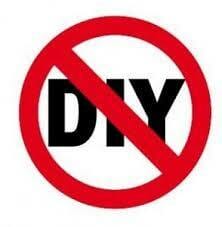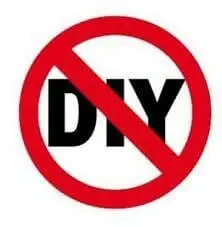 The strongest and most successful businesses aren’t those that out-spend their competitors. Rather, they out-smart them by knowing when taking a do-it-yourself (DIY) approach makes strategic and financial sense — and when it’s a really bad idea.
The strongest and most successful businesses aren’t those that out-spend their competitors. Rather, they out-smart them by knowing when taking a do-it-yourself (DIY) approach makes strategic and financial sense — and when it’s a really bad idea.
What does this have to do with cloud phone systems? It’s this: there are some mass market cloud phone system vendors in the marketplace that want businesses to think that a DIY cloud business phone system is easy, smart and cost-effective.
However, if you ask an overwhelming number of businesses that have been misled by this hype, you’ll discover that the experience is tedious, disappointing and expensive; the latter because within weeks (or sometimes days) of implementation, businesses are forced to call a cloud solutions provider to come to the rescue, and put in place the phone system that they believed they were getting to begin with!
Still not convinced? That’s good: because here at Carolina Digital Phone, we deal in facts instead of myths, and believe that an educated customer is the best customer. With this in mind, here are the three reasons why a DIY cloud phone system will soon have you sending out an SOS:
1. If something goes wrong, you’ll be on your own — unless you’re willing to pay.
You can completely ignore any service promises that mass market cloud system vendors make, because WHEN (not if!) you have an issue or need to reconfigure your system, you’ll be told that your only option is to purchase a ridiculously expensive maintenance plan, or pay through the nose for a technician to provide on-site service.
However, if you purchase your system from a legitimate cloud solution provider, then you’ll get exceptional and responsive technical support without paying an extra cent. What’s more, your cloud phone system will include a managed router, which enables technical experts to perform a wide range of maintenance, troubleshooting and configuration tasks remotely — which means they can be taken care of rapidly; often within minutes or hours of identifying an issue or submitting a request
2. Don’t count on the help resources being all that helpful.
 You may have some talented technicians in your business who can solve all kinds of challenges. But even these DIY wizards are going to fly the white flag of surrender when they see what kind of “helpful resources” are in store for them when it comes to dealing with cloud configurations and issues: outdated FAQs, useless videos, and manuals that are so incomprehensible that they might as well be from IKEA.
You may have some talented technicians in your business who can solve all kinds of challenges. But even these DIY wizards are going to fly the white flag of surrender when they see what kind of “helpful resources” are in store for them when it comes to dealing with cloud configurations and issues: outdated FAQs, useless videos, and manuals that are so incomprehensible that they might as well be from IKEA.
On the other end of the spectrum, your in-house IT team won’t face any installation or support burden. Everything is handled by your cloud solutions provider. That means no white flags of surrender (or angry emails saying “if I get one more end user asking me how to set up the auto attendant feature I’m going to go @#!@*&! crazy!”).
3. Don’t expect to take the shortest path to value.
It goes without saying that you want to start reaping the rewards of your cloud phone system ASAP, so that you can take the shortest path to value and start generating cost savings and performance gains. But none of this is going to happen with a DIY system, because it’s not a set-it-and-forget-it thing. To get the most value, you need to monitor various metrics, and optimize based on actual system usage. You may also need to resolve issues with your ISP (some ISPs are notorious for exaggerating bandwidth speeds, and a cloud phone system is going to reveal the truth!).
Fortunately, with a cloud solutions provider, you don’t have to worry about paying more for less, or taking the long and winding road to value and ROI. That’s because they — not you — will take care of all system monitoring, testing and optimization, and make sure that you’re firing on all cylinders.
The Bottom Line
There are times when doing things DIY makes sense. But then there are other times when partnering with experts is the right way to go — and switching to a cloud phone system definitely applies! We’ll conclude with the sage advice of 19th century social thinker and philanthropist John Ruskin:
“It’s unwise to pay too much, but it’s worse to pay too little. When you pay too much, you lose a little money – that’s all.
When you pay too little, you sometimes lose everything, because the thing you bought was incapable of doing the thing it was bought to do.
The common law of business balance prohibits paying a little and getting a lot – it can’t be done. If you deal with the lowest bidder, it is well to add something for the risk you run, and if you do that you will have enough to pay for something better.”


